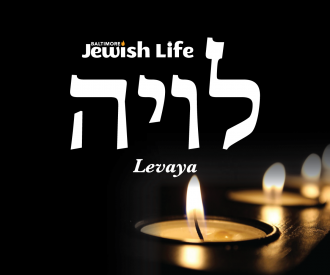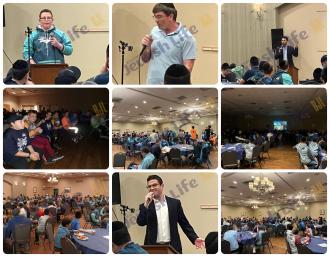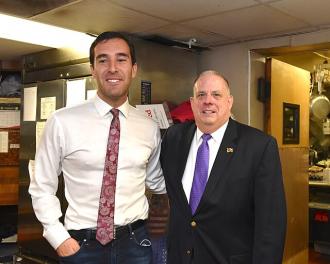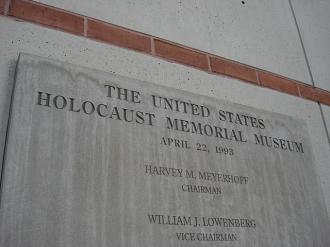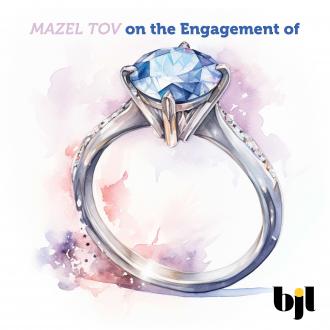In this week’s Parshah, Hashem informs us that during exile we will ultimately sin and serve idols. As punishment, Hashem promises that “I will conceal My face from them” (31:17). The Torah then states that even after we acknowledge that our suffering is due to the fact that Hashem left our midst, and we regret our sins, He will still “surely” conceal His face from us (31:18. See Ohr HaChaim).
It makes sense that after we serve idols, Hashem will conceal His face from us. However, why is it that even after we recognize that our suffering is due to our own sins which drove G-d away from our midst, that He will continue to hide His face from us? Additionally, why is it that after we acknowledge that Hashem left our midst, Hashem uses an even harsher expression of “surely”?
The following true story, related by Elan Perchik in the name of R’ Chaim Rosenfeld, will make everything clear:
Mr. Goldstein lived in London, England. He and a couple of friends decided one year to fly to Israel for Yom Kippur, to hear a famous chazzan whose voice was legendary, lead the davening in a particular shul. As Mr. Goldstein boarded his flight and sat in his assigned seat, he noticed that an unaffiliated Jew was sitting right next to him. Mr. Goldstein extended a warm welcome. “Hi, how are you doing? What’s your name?”. Hearing the greeting of a fellow Jew, the man replied “my name is Morris Shechter. How are you?”. The two began conversing, and eventually the conversation turned to Judaism. “You know”, said Mr. Goldstein, “why don’t you come to my house for a Shabbos sometime when we get back to England?”. “No, no”, Morris quickly retorted, “I’m done with Judaism”. He rolled up his sleeve and showed him the numbers on his arm. “I had only one son, and I loved him more than anything in the world. When the Nazis took him, I was devastated beyond description. It’s been over 30 years since I’ve seen him. I don’t know exactly what happened to him, but he must have been killed. How could Hashem have forsaken me like that? After that, I decided that I was through with Judaism”. Mr. Goldstein didn’t know what to say. He hoped to get Morris’ phone number at some later point of the flight so that he could follow up with him anyways, but when the plane landed, Morris rushed out and never gave Mr. Goldstein the opportunity to do so.
Mr. Goldstein enjoyed his next few days before Yom Kippur in Israel. When the Yom Kippur prayers finally began, he was thrilled with his decision to fly in. The chazzan’s sweet, melodious voice was simply marvelous. On Yom Kippur morning, when it was time for Yizkor, the memorial service for those who passed away, Mr. Goldstein decided to take a quick walk outside, as both of his parents were still alive and well. Making his way around the block, he thought he saw a familiar face in the distance. It was a man sitting on a park bench, eating a sandwich. When he got closer to the man, Mr. Goldstein could not believe his eyes. “Morris?”. The man picked up his head and nodded. “Goldstein, how are you doing?”. “Morris”, he said gently, "did you know that today is Yom Kippur. Almost everyone fasts on Yom Kippur, even those who barely have any connection to Judaism”. “Didn’t I tell you”, Morris said bitterly as he took another bite from his sandwich, “I have nothing to do with religion. G-d abandoned me, and so, I abandoned Him”. Standing there in disbelief, Mr. Goldstein searched for the right words to say. “Listen, the people in Shul are saying Yizkor right now. Why don’t you come in and mention your son? You will be honoring him and his memory greatly by doing so”. Morris hesitated. "Do it for your son”, Mr. Goldstein insisted. After a moment of silence, Morris said quietly “but I’m not even dressed appropriately enough to walk inside”. “Don’t worry about that, just come inside”. After some back and forth, Morris reluctantly agreed.
As they walked into the Shul, those standing inside took note of Morris’ entry. He clearly stood out of place, but nevertheless, he kept on moving slowly towards the bimah where the chazzan was standing. When it was Morris’ turn, the chazzan turned to him and asked “what’s the niftar’s (one who passed away's) name?”. “Yaakov”. “And what is your name?”, asked the chazzan. “Morris”. “No, no", interrupted the chazzan, "what’s your Hebrew name?”. “Moshe”. “Okay, Yaakov ben Moshe”. Suddenly, the chazzan paused. A few seconds went by as the chazzan stood there in silence. Turning back to Morris, he asked “and what’s your last name?”. “My last name?", Morris astounded confusedly. “Why do you need my last name? Yizkor doesn’t require a last name”. “Just tell it to me”, the chazzan repeated. “It’s Shechter”, was Morris’ reply. There was dead silence in the shul. Amid tears, the chazzan looked straight into Morris’ eyes and said “Abba? Is that you? Where were you? I have been desperately looking for you for 37 years! After the holocaust, I didn’t know where to find you. I am your son. I am Yaakov ben Moshe Shechter!”.
With this true story, we can answer our question. The Torah is stating that the first sin that the Jewish nation will be punished for is idol worship. However, even after they correctly acknowledge that they were being punished by Hashem, the fact that they will state that Hashem "is not in our midst” and has abandoned them, is an even greater sin. For by doing so, they are dismissing the fact that Hashem is ALWAYS in control and running every event of our lives, even during our darkest hours. In fact, Hashem is as actively involved in our lives today, during exile, as He was during our miraculous existence in the desert, albeit more subtly. He never has, and never will, ever abandons us.
Living Inspired
Unesaneh Tokef, the Rosh Hashanah prayer which details how Hashem decrees life and death to the smallest detail, is famous for striking awe and trepidation into our hearts. At the same time, its message should provide us with the following reassurance: Hashem, Who is tov and a meitiv (beneficent and always doing good), is the ONLY One Who controls every single detail of our lives. Not a single occurrence in our day to day lives happens without His explicit instruction. Even during our darkest hours, whether openly or from behind the scenes, Hashem is always guiding every moment of our lives in accordance with His beneficent plan for us.
In light of this fact, the very promise that Hashem will hide His face from us when we sin (ibid), is really a blessing in disguise. It is a reassuring promise that even during our darkest exile, Hashem will continue to always be with us. Only, at times, He will appear to be hidden.
Although it may require work, if we look closely for Hashem, we can find Him in every aspect of our lives.

